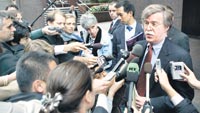|
Chapter
VII a dangerous tool in the hands of Bush administration
By
Thalif Deen at
the united nations
NEW YORK - When the US-led coalition
invaded Iraq more than three years ago, the Bush administration
legally justified it on the ground that the resolution
adopted by the Security Council called for military
action under Chapter VII of the UN charter.
Despite the fact that the resolution
did not specifically call for military action against
Iraq, the US interpreted the existing resolution to
justify its action. The crucial element in the resolution
was the invocation of Chapter VII which calls for "action
with respect to threats to the peace, breaches of the
peace, and acts of aggression."
 |
| John Bolton (R), United States
Ambassador to the United Nations, speaks to the
media after a morning meeting of the five permanent
members of the Security Council (Britain, China,
France, Russia and United States) plus Japan, where
they discussed a resolution on the North Korea nuclear
situation on Wednesday at the French mission in
New York. AFP |
But that interpretation brought a
strong negative response from Secretary-General Kofi
Annan himself who unequivocally ruled that the Iraq
war was "illegal" because it did not have
clear and unambiguous Security Council authorization.
The argument was that there should have been a second
resolution calling for military action: a resolution
which the US knew would have been vetoed by either China
or Russia, or both.
Annan's statement about the "illegality"
of the war was also a turning point in his 10-year tenure
in the world body. The right wing neo-conservatives
in the US, the linchpin of the Bush administration,
not only never forgave Annan for his outspokenness but
also went on a witch hunt trying to destroy his credibility
and to politically lynch him in public.
The Russians and the Chinese, two
veto-wielding permanent members of the Security Council,
perhaps learnt it the hard way that the Americans could
use the nuances of the English language to craftily
justify whatever they do: torture prisoners, hold terror
suspects in indefinite detention, violate human rights,
re-interpret the Geneva conventions to suit their purpose,
or even go to war.
But the skilful misinterpretation
of Chapter VII by the Bush administration in the war
on Iraq has now come back to haunt the White House –
this time in relation to North Korea. Since Chapter
VII makes sanctions mandatory and military action a
strong possibility, both Russia and China are now stalling
on a US resolution aimed at punishing North Korea for
conducting its first nuclear test. Punish North Korea,
yes. Chapter VII, no.
When the Bush administration sought
a resolution against North Korea last July to penalize
Pyongyang for launching long-range missiles, Russia
and China agreed to support the resolution only after
Washington dropped the reference to Chapter VII. After
the bitter experience of Iraq – where the US cleverly
outmanoeuvred the Security Council on military action
– the Russians and Chinese remain wary. They think
that Chapter VII is a dangerous instrument in the hands
of the Bush administration.
While both Russia and China think
that North Korea should be penalized for its nuclear
testing, they don't want stringent economic sanctions
against Pyongyang or a US military attack. North Korea
has been a political and military ally of both China
and Russia, and therefore both countries are obviously
willing to protect Pyongyang -- just as much as the
US is bent on safeguarding Israel, right or wrong.
A visibly exasperated John Bolton,
the much-maligned US ambassador to the UN, has been
saying that Chapter VII will not be a pretext for military
force. "It's simply incorrect," he told reporters
last week. "It would require a separate resolution,
if one were needed, to authorize the use of force."
But Bolton's interpretation was far different from that
of his predecessors who justified the US invasion of
Iraq based on a Chapter VII resolution.
The growing opposition to US punitive
action in several global political hotspots -- including
Iran, Zimbabwe, Sudan and Myanmar (Burma) -- has rankled
the Bush administration. Both Russia and China have
continued to stall proposed US actions against all four
countries -- including Chapter VII enforcement.
Richard Grenell, a spokesman for Bolton,
reflected his boss' obvious irritation when he told
reporters that Russia and China were blocking action
against the four countries. "It's all right to
keep talking if you are really going to get action,
but not if it's just delay, and delay and delay."
After North Korea, the Bush administration
plans to also move against Iran for its continued nuclear
enrichment programme. But any US resolution that calls
for Chapter VII enforcement is likely to be shot down
in the Security Council.
In an editorial titled "The Age
of Impunity," the New York Times said last week
that the US is being increasingly challenged by its
political adversaries. Sudan has refused to permit a
UN peacekeeping force into its politically troubled
Darfur. Iran is defiantly enriching uranium.
"It wasn't supposed to be this
way. The Iraq war and President Bush's with-us-or-against-us
war on terrorism were supposed to frighten the bad guys
so much that they wouldn't dare cross the United States.
But the opposite has happened," the Times said.
The reason: the US has squandered both its moral authority
and lost its moral high ground in the world.
|
